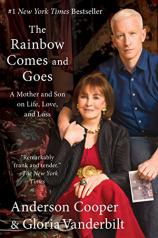The Rainbow Comes and Goes: A Mother and Son on Life, Love, and Loss
Review
The Rainbow Comes and Goes: A Mother and Son on Life, Love, and Loss
CNN/CBS journalist and correspondent Anderson Cooper always considered his relationship with his mother, Gloria Vanderbilt, to be a close one. After all, since the early deaths of his father and brother, it had been just the two of them. But when his formidable mother was felled by a serious illness in her 91st year, Cooper realized that there were many topics he had been afraid to broach with her. As she recovered, he decided to initiate a very unique and modern correspondence with her, through email, where each could ask the other those nagging, lingering questions before it was too late. THE RAINBOW COMES AND GOES is the moving and gratifying result.
Gloria Vanderbilt has been famous practically all of her 92 years. She was born in 1924 to Gloria Morgan and Reginald Vanderbilt, and into a life of enormous wealth and privilege. But as she came to symbolize a few years later, when dubbed the “Poor Little Rich Girl,” money can’t buy happiness. Her mother was only 18 when she gave birth, and little Gloria’s father, much older than his bride, would die less than two years after her birth. Young Gloria was primarily brought up by her beloved nanny, Emma Keislich, whom she called “Dodo,” and her maternal grandmother, whom she referred to as “Naney,” since her young socialite mother showed little interest in her. But when her financial stability seemed to be on shaky ground, Gloria Senior started taking an interest in her child, moving her to Paris.
Dodo and Naney conspired to abscond back to America with the child, thus kicking off one the biggest scandals of the day, and leading to what was called the “Trial of the Century,” when young Gloria’s mother and grandmother battled for custody. And the battle was brutal. Many witnesses came forward claiming that Gloria Senior was an unfit mother --- even the scandalous reveal that she was a lesbian. Grandmother Morgan won custody, and little Gloria went to live with her Aunt Gertrude on Long Island, where she received stability and a fine education but little familial warmth. Her mother flitted in and out of her life, but there was never any real relationship of which to speak.
"This remarkable little tome is not just for parents and adult children. It’s for anyone who loves someone but wonders how to broach difficult subjects."
It was because of this that Vanderbilt felt inadequate in later years, when she became a parent herself. She never really had any role models to demonstrate how a loving parent would and should act. And desperately wanting attention from the one person who is supposed to love you unconditionally but never getting it led Vanderbilt down a long, circuitous road to romance as well. She married four times and had four children (two sons with her second husband, Leopold Stokowski, and two more sons with her fourth and final husband, Wyatt Cooper, the youngest being Anderson).
Despite the ups and downs of her remarkable life, Vanderbilt never let her circumstances consume her. If anything, the difficult events of her youth spurred her on to be successful at whatever she did: “My drive certainly comes from the experiences I had early on, the fear, and all the other feelings that built up in me as a child…. I did this because I believed that if I succeeded in writing, or acting, or painting, it would expiate in some mysterious and secret way the public vilification of my mother and free her to love me as I longed to be loved.” This drive to succeed despite the tragedies of one’s youth is something Vanderbilt shares with her successful son. His father died of heart failure at the age of 50, when Anderson was only 10 years old. His older brother, Carter, committed suicide at age 23, when Anderson was still in college: “…if I hadn’t been left reeling from those losses, would I have taken the risks I did early on in my life and my career? I don’t think so.”
After college, desperate to make a name for himself, Cooper picked up a video camera and traveled to war-torn territories all over the globe, reporting his own stories of what he witnessed there, eventually leading to his correspondent job at CNN, where he now hosts his own show, along with reporting for “60 Minutes.” But now, this email correspondence with his mother is giving Cooper a little time for reflection: “From more than two decades now, I’ve moved constantly from one place to another, one story to the next, never allowing myself to slow down for long. I’ve worried that if I become too self-reflective or too mired in the past, the losses of Carter and Daddy, I will no longer be able to function, no longer be able to breathe.” But throughout these storms, mother and son have weathered them together, perhaps even stronger for it. Vanderbilt ponders, “Is loss easier to bear when you know it well? Perhaps. No longer an adversary, it becomes a friend.”
This remarkable little tome is not just for parents and adult children. It’s for anyone who loves someone but wonders how to broach difficult subjects. The point of this literary experiment, according to Cooper, was so that they could finally address those long-held but never-asked questions before it’s too late. It becomes too easy to “…put off discussing complex issues or raising difficult questions. We think we’ll do it one day, in the future, but life gets in the way, and then it’s too late. I didn’t want there to be anything left unsaid between my mother and me…” (“Nothing Left Unsaid” is also the name of the companion documentary about Cooper and his mother that’s currently airing on HBO --- I highly recommend that as well). Because of this experiment, both Cooper and Vanderbilt found that their relationship had changed --- it became deeper than ever before, with more understanding on each side.
The title “The Rainbow Comes and Goes” comes from a Wordsworth poem that Vanderbilt is fond of quoting, as it expresses her optimistic philosophy on life and how to live it: “Nothing is meant to last forever. Our lives are fleeting. We surround ourselves with objects, collect things, try to hold on to people and money and status, but it doesn’t last. We are not meant always to be happy, and who would want to be? Happiness becomes meaningless if it were a constant state…. No one escapes. The rainbow comes and goes. Enjoy it while it lasts. Don’t be surprised by its departure, and rejoice when it returns.” And rejoice in reading (and sharing) this touching, beguiling book.
Reviewed by Bronwyn Miller on April 28, 2016
The Rainbow Comes and Goes: A Mother and Son on Life, Love, and Loss
- Publication Date: January 31, 2017
- Genres: Memoir, Nonfiction
- Paperback: 320 pages
- Publisher: Harper Paperbacks
- ISBN-10: 0062454951
- ISBN-13: 9780062454959











